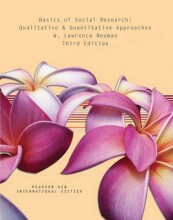Survey & Interview - Interviews
7 important questions on Survey & Interview - Interviews
What is the ideal behavior of the interviewer?
- Not judgmental
- Does not correct errors
- Remains neutral and objectives
- Controls the topic
- Keeps consistent tone
- Obtain cooperation
- Reduce fear and embarrassment
What are the three types of interviews?
- no questions prepared
- unique interviews
- flexible probing
- low reliability
- difficult to replicate
- some questions prepared
- partly unique interviews
- partly flexible
- partly replicable
Structured
- questions prepared
- similar interviews
- rigid
- high reliability
- replicable
What are the 3 interview stages?
- Entry: introducing yourself, securing cooperation.
- Main interview: asking questions and recording answers.
- Exit: thank respondent, leave and record important details.
- Higher grades + faster learning
- Never study anything twice
- 100% sure, 100% understanding
What is interviewer bias?
- Wording of questions influences answers
- Interviewer's visible characteristics
- Social setting can also affect responses
Interview bias less pronounced in online and more structured interviews.
What are the 3 ways in which interviews can be transcripted?
- Full/pure verbatim
- Intelligent/smart verbatim
- Edited/non verbatim
What are the 3 types of interpretations?
- 1st order: viewpoint of people being studied.
- 2nd order: the researchers own viewpoint on the data.
- 3rd order: the researchers connection between empirical data and abstract concepts or theory .
What are the ethic rules when it comes to surveys?
- Respondents have right to privacy
- Some questions may threaten privacy
- Emphasize anonymity, confidentiality and privacy in informed consent
- Respondents have right to stop the survey
- Be careful with sensitive issues
- Pseudosurveys
- Manipulate respondents into doing something
- Sloppy reporting permits abuse
- Media disorts true survey findings
The question on the page originate from the summary of the following study material:
- A unique study and practice tool
- Never study anything twice again
- Get the grades you hope for
- 100% sure, 100% understanding































